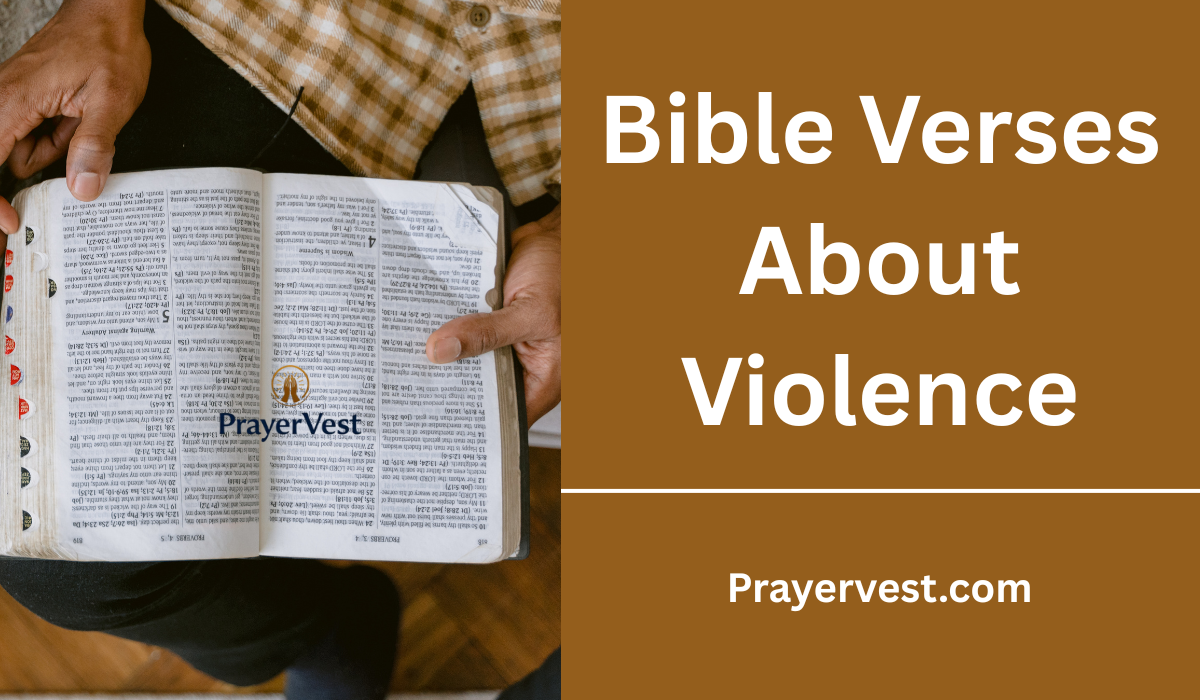Since the beginning of time, violence has been a reality that has severely damaged people’s bodies, minds, and souls. The Bible clearly tackles this ubiquitous problem, providing both cautions and instructions on how to deal with brutality and hostility.
Scripture sheds light on the origins of violence, its effects, and the ways to achieve peace and reconciliation via tales of ancient conflicts and everlasting moral precepts. Studying these scriptures gives believers the knowledge they need to survive in a world where violence and harm can happen at any time.
The Bible contains stories of acts of violence by people, nations, and even groups, along with God’s reactions to them. The Scriptures constantly emphasize God’s desire for justice, fairness, and peace while also depicting the realities of human rage, injustice, and violence.


Verses regarding violence frequently have two purposes: they highlight the destructive nature of sin and human foolishness while also offering hope for heavenly protection and final punishment for transgressions. Readers can better comprehend the moral and spiritual ramifications of aggressive behavior by thinking about these passages.
The Bible contains stories of acts of violence by people, nations, and even groups, along with God’s reactions to them. The Scriptures constantly emphasize God’s desire for justice, fairness, and peace while also depicting the realities of human rage, injustice, and violence. Verses regarding violence frequently have two purposes: they highlight the destructive nature of sin and human foolishness while also offering hope for heavenly protection and final punishment for transgressions. Readers can better comprehend the moral and spiritual ramifications of aggressive behavior by thinking about these passages.
40 Powerful Bible Verses About Violence (2026)
1. Genesis 4:10
“The voice of your brother’s blood cries out to me from the ground.”
After Cain kills Abel, God addresses the gravity of human violence. This verse emphasizes that acts of violence are not hidden from God—He hears the cries of the innocent. It teaches that violence leaves spiritual and moral consequences, resonating beyond the immediate act. God’s awareness of bloodshed shows His justice and His concern for the sanctity of life.
2. Exodus 21:23-25
“But if there is serious injury, you are to take life for life, eye for eye, tooth for tooth…”
These verses establish principles of proportional justice in response to violence. They illustrate that God recognizes the need for order and accountability when life is harmed. The law was meant to curb escalating violence, ensuring that justice is measured, not vengeful. It underscores that violence has repercussions and that society must uphold the value of life.
3. Proverbs 3:31
“Do not envy a violent man or choose any of his ways.”
This proverb warns against admiring or following those who use violence to gain power or advantage. God instructs His people to reject violent methods, teaching that true strength lies in righteousness, not intimidation. Avoiding violent behavior fosters peace and integrity, protecting individuals from moral corruption and societal harm.
4. Isaiah 1:17
“Learn to do right; seek justice. Defend the oppressed. Take up the cause of the fatherless; plead the case of the widow.”
Here, God calls His people to act against violence and injustice. Instead of perpetuating harm, believers are to protect those who are vulnerable. This verse reframes the conversation about violence—focusing not just on its avoidance but on active resistance against oppression. Righteous action is an antidote to societal and personal violence.
5. Matthew 5:9
“Blessed are the peacemakers, for they will be called children of God.”
Jesus highlights the spiritual reward of pursuing peace rather than conflict. This teaching challenges natural human impulses toward retaliation or aggression. By choosing peacemaking over violence, believers align themselves with God’s heart and demonstrate divine love and reconciliation in a broken world.
6. Romans 12:19
“Do not take revenge, my dear friends, but leave room for God’s wrath, for it is written: ‘It is mine to avenge; I will repay,’ says the Lord.”
Paul instructs believers to resist personal vengeance. Violence often begets violence, but entrusting justice to God prevents cycles of harm. This verse teaches patience, restraint, and trust in God’s ultimate judgment, affirming that divine justice is perfect, impartial, and more righteous than human retaliation.
7. James 1:19-20
“Everyone should be quick to listen, slow to speak and slow to become angry, because human anger does not produce the righteousness that God desires.”
Violence often begins with uncontrolled anger. James highlights the importance of self-control in preventing violent acts. By cultivating patience and thoughtful responses, believers reflect God’s righteousness and contribute to healthier, safer communities.
8. Psalm 11:5
“The Lord examines the righteous, but the wicked, those who love violence, he hates with a passion.”
This psalm underscores God’s disapproval of violence and injustice. It serves as a warning that embracing violent behavior distances one from God. Conversely, living righteously and resisting aggression aligns believers with His protective and just nature.
9. Micah 6:8
“He has shown you, O mortal, what is good. And what does the Lord require of you? To act justly and to love mercy and to walk humbly with your God.”
Violence is incompatible with God’s requirements for His people. This verse distills the divine call to justice, mercy, and humility—principles that actively oppose harm and aggression. Walking in these values creates communities marked by safety, fairness, and care for one another.
10. 1 Peter 3:9
“Do not repay evil with evil or insult with insult. On the contrary, repay evil with blessing, because to this you were called so that you may inherit a blessing.”
Peter encourages believers to break the cycle of violence through kindness and blessing. Retaliation only perpetuates harm, whereas responding with good demonstrates the transformative power of God’s love. This approach reflects spiritual maturity and fosters peace even in hostile circumstances.
11. Proverbs 16:29
“A violent person entices their neighbor and leads them down a path that is not good.”
This proverb reveals the contagious nature of violence. Aggression doesn’t exist in isolation—it influences others and corrupts communities. God warns that those who engage in violence often draw others into sin. It teaches the importance of rejecting violent behavior not just for ourselves, but to protect and guide others toward righteousness.
12. Leviticus 19:18
“Do not seek revenge or bear a grudge against anyone among your people, but love your neighbor as yourself. I am the Lord.”
This commandment counters the human impulse toward vengeance. God’s law prioritizes love and community harmony over violent retaliation. It reminds believers that interpersonal conflict should be resolved through compassion, forgiveness, and empathy, not force or aggression.
13. Psalm 34:14
“Turn from evil and do good; seek peace and pursue it.”
The psalmist emphasizes the proactive pursuit of peace. Violence is not only a moral failing but a path that distances us from God’s blessings. Choosing good and actively pursuing peace fosters spiritual and societal well-being, reflecting a life aligned with divine principles.
14. Isaiah 57:20-21
“But the wicked are like the tossing sea, which cannot rest, whose waves cast up mire and mud. There is no peace,” says my God, “for the wicked.”
Violence and wickedness disrupt peace, both internally and externally. This verse illustrates that turmoil and aggression create chaos, preventing rest and stability. God’s justice is inherently tied to peace, and those who embrace violence live in spiritual instability.
15. Matthew 26:52
“Put your sword back in its place,” Jesus said to him, “for all who draw the sword will die by the sword.”
Jesus teaches a principle of restraint and nonviolence. Even in moments of threat, retaliation is not the solution. This verse underscores the spiritual and practical consequences of violence and calls believers to trust God rather than resort to aggression.
16. Romans 13:4
“For the one in authority is God’s servant for your good. But if you do wrong, be afraid, for rulers do not bear the sword for no reason. They are God’s servants, agents of wrath to bring punishment on the wrongdoer.”
This passage acknowledges that God allows lawful authority to curb violence and maintain justice. While personal retaliation is discouraged, God’s justice can work through structures of order to protect the innocent and punish the guilty. It reminds believers that God is ultimately concerned with justice.
17. Ecclesiastes 3:8
“A time to love and a time to hate, a time for war and a time for peace.”
This verse recognizes the reality of human conflict while emphasizing divine timing. Not all violence is arbitrary—God distinguishes when action is necessary and when peace must prevail. Wisdom lies in discerning God’s timing and purpose rather than acting impulsively.
18. Habakkuk 1:3
“Why do you make me look at injustice? Why do you tolerate wrongdoing? Destruction and violence are before me; there is strife, and conflict abounds.”
The prophet laments the prevalence of violence and injustice. This verse reveals God’s awareness of human suffering and the need for accountability. It encourages believers to bring their concerns to God, trusting Him to address violence and uphold justice.
19. Proverbs 12:20
“Deceit is in the hearts of those who plot evil, but those who promote peace have joy.”
Violence is often rooted in deception and malice. Conversely, cultivating peace brings joy and spiritual fulfillment. This proverb illustrates that God values integrity and peace over cunning or aggressive tactics, reinforcing that violence undermines spiritual well-being.
20. 1 Thessalonians 5:15
“Make sure that nobody pays back wrong with wrong, but always strive to do what is good for each other and for everyone else.”
Paul reinforces the principle of breaking cycles of violence. Believers are called to respond to wrong with good, reflecting God’s justice and mercy. This proactive approach transforms relationships and communities, reducing harm while promoting God’s vision of peace.
21. Psalm 37:9
“For those who are evil will be destroyed, but those who hope in the Lord will inherit the land.”
This psalm reassures believers that God will ultimately handle evildoers. Violence and injustice may seem triumphant temporarily, but God’s justice prevails in the end. Trusting Him allows believers to resist the temptation of violent retaliation and to walk in faith and patience.
22. Proverbs 29:11
“Fools give full vent to their rage, but the wise bring calm in the end.”
Violence often arises from uncontrolled anger. This proverb contrasts impulsive aggression with the wisdom of restraint. God encourages temperance and careful thought, showing that peace is a hallmark of spiritual maturity.
23. Isaiah 2:4
“He will judge between the nations and will settle disputes for many peoples. They will beat their swords into plowshares and their spears into pruning hooks. Nation will not take up sword against nation, nor will they train for war anymore.”
This prophetic vision presents God’s ultimate desire: a world without violence. The imagery of transforming weapons into tools of productivity illustrates how God’s justice and peace restore human society. It inspires hope for reconciliation and a future free from conflict.
24. Micah 4:3
“He will judge between many peoples and will settle disputes for strong nations far and wide. They will beat their swords into plowshares and their spears into pruning hooks. Nation will not take up sword against nation, nor will they train for war anymore.”
Echoing Isaiah, Micah emphasizes God’s plan for universal peace. Violence, whether interpersonal or national, is ultimately incompatible with God’s kingdom. Believers are called to live in anticipation of this peace by fostering harmony in their own communities.
25. Zechariah 8:16-17
“These are the things you are to do: Speak the truth to each other, and render true and sound judgment in your courts; do not plot evil against each other, and do not love to swear falsely. I hate all this,” declares the Lord.”
Violence often arises from deceit, injustice, and betrayal. God calls His people to honesty and justice as antidotes to conflict. Living truthfully and justly prevents the escalation of violence and reflects God’s heart in human interactions.
26. Luke 6:27-28
“But to you who are listening I say: Love your enemies, do good to those who hate you, bless those who curse you, pray for those who mistreat you.”
Jesus presents radical nonviolence as a spiritual principle. Responding to aggression with love transforms situations and demonstrates God’s power over hatred. It challenges believers to break the natural cycle of retaliation and embrace divine wisdom.
27. Romans 14:19
“Let us therefore make every effort to do what leads to peace and to mutual edification.”
Paul stresses active peacemaking. Violence and conflict harm both individuals and communities, but seeking peace strengthens relationships and aligns with God’s purposes. Believers are called to pursue reconciliation as a spiritual duty.
28. Colossians 3:15
“Let the peace of Christ rule in your hearts, since as members of one body you were called to peace. And be thankful.”
The peace of Christ is a guiding principle that helps believers resist violent impulses. Gratitude and spiritual mindfulness act as buffers against anger and aggression. This verse underscores that internal peace contributes to external harmony.
29. 2 Timothy 2:24-25
“And the Lord’s servant must not be quarrelsome but must be kind to everyone, able to teach, not resentful. Opponents must be gently instructed, in the hope that God will grant them repentance leading them to a knowledge of the truth.”
Paul teaches that confrontation should never become violent. Patience, gentleness, and teaching are more effective than aggression. Believers are called to transform conflict through Godly wisdom rather than force.
30. James 4:1-2
“What causes fights and quarrels among you? Don’t they come from your desires that battle within you? You desire but do not have, so you kill. You covet but you cannot get what you want, so you quarrel and fight.”
James identifies the root of violence: unrestrained desires and selfishness. Understanding this source helps believers address internal struggles before they manifest in harm to others. God calls us to self-control and humility as preventive measures against violence.
31. 1 John 3:15
“Anyone who hates a brother or sister is a murderer, and you know that no murderer has eternal life residing in him.”
John equates hatred with violence at the spiritual level. God emphasizes that inner malice can manifest as external harm. True spiritual life requires love and reconciliation, showing that violence begins in the heart.
32. Deuteronomy 32:35
“It is mine to avenge; I will repay. In due time their foot will slip; their day of disaster is near and their doom rushes upon them.”
God reminds His people that vengeance belongs to Him alone. Attempting personal revenge often leads to cycles of violence. Trusting God’s timing ensures justice without compromising righteousness or peace.
33. Jeremiah 22:3
“This is what the Lord says: Do what is just and right. Rescue from the hand of the oppressor the one who has been robbed. Do no wrong or violence to the foreigner, the fatherless or the widow, and do not shed innocent blood in this place.”
God commands active protection against violence and injustice. Serving the vulnerable and upholding righteousness counters the spread of aggression, reflecting His heart for justice and peace.
34. Psalm 146:7
“He upholds the cause of the oppressed and gives food to the hungry. The Lord sets prisoners free.”
Violence often subjugates and oppresses. This psalm celebrates God’s protection of the defenseless, emphasizing that He champions justice. Believers are called to align themselves with God’s defense of the vulnerable, opposing violence through care and action.
35. Proverbs 15:1
“A gentle answer turns away wrath, but a harsh word stirs up anger.”
Words can either escalate or diffuse conflict. God teaches that gentleness prevents violence, while harshness provokes it. This principle reminds believers to respond thoughtfully, promoting peace in all interactions.
36. Exodus 23:5
“If you see the donkey of someone who hates you fallen down under its load, do not leave it there; be sure you help them with it.”
God instructs kindness even toward adversaries. Acts of mercy prevent cycles of retaliation and demonstrate that practical, loving action is stronger than aggression. Believers reflect God’s character through benevolence, not force.
37. Matthew 5:44
“But I tell you, love your enemies and pray for those who persecute you.”
Jesus reinforces that love is the antidote to violence. By praying for enemies, believers counter hatred with spiritual power, breaking cycles of conflict and modeling divine mercy.
38. 1 Peter 2:23
“When they hurled their insults at him, he did not retaliate; when he suffered, he made no threats. Instead, he entrusted himself to him who judges justly.”
Peter points to Christ’s example of non-retaliation. Even in the face of violence and injustice, believers are called to trust God rather than respond aggressively, showing the strength of faith over force.
39. Psalm 7:11
“God is a righteous judge, a God who displays his wrath every day.”
This verse affirms that God actively judges wrongdoing. While human violence may persist, God’s justice is unwavering. Believers are encouraged to rely on Him rather than take violent matters into their own hands.
40. Revelation 21:4
“He will wipe every tear from their eyes. There will be no more death or mourning or crying or pain, for the old order of things has passed away.”
The ultimate promise of God’s kingdom is a world free from violence and suffering. This vision offers hope, inspiring believers to pursue peace, justice, and love in preparation for a time when violence is no more.
Conclusion
The Bible presents a significant viewpoint on violence, highlighting the need to seek justice and peace as well as the negative effects of hostility. Scripture shows that violence is a mirror of deeper spiritual and moral issues rather than just a physical act through its parables, proverbs, and teachings. Believers are reminded of the value of moderation, discernment, and empathy in handling conflict by reflecting on these verses. Knowing God’s position on violence enables us to face difficult circumstances with integrity, faith, and a dedication to righteousness.
In the end, the Bible offers both caution and hope. God’s teaching inspires believers to behave with love, seek reconciliation, and trust in His justice, even while violence causes damage and pain. By putting these verses’ lessons into practice, we can help create a world characterized more by harmony, peace, and understanding than by conflict. Allow the light of God’s wisdom to shine in even the most trying situations by using these texts as inspiration for deliberate living, cautious discourse, and brave but measured answers.






